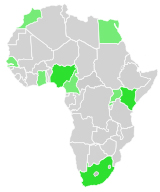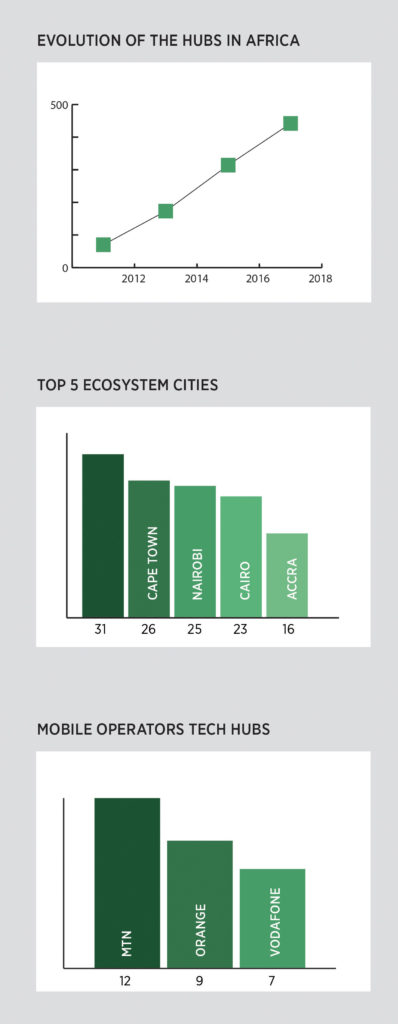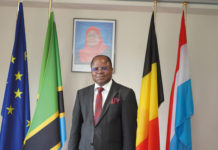The digital economy has changed the world. In Africa, the arrival of mobile phones was a booming revolution, connecting the continent in a way that was never achieved before. A few years later, tech-start-ups are becoming an important part of the economic ecosystem and changing lives by solving major daily problems in vast areas such as agriculture, health, rural electrification, education. At the source of the innovation lies a bottom-up approach that saw many start-ups evolve in a positive environment induced by tech-hub incubators1 all over the continent. In 2017, a massive investment in venture capital of 560 million in 2017 took place, representing an increase of 53% compared to 2016. The disruptive innovation movement led by African start-ups is only just getting started.
Emergence of digital hubs
Before mobile phones, being connected was an expensive and inaccessible luxury. The arrival of these devices opened a world of opportunities and was a revolution. Africa jump started its digital economy thanks to the mobile devices. 
The adventure started it Kenya, that could be considered as the founding father of the digital economy, solving societal problems and paving the way for the emergence of digital hubs. The arrival of M-PESA, a solution that made payments through mobile phone possible by sending text messages changed the economy and paved the way for further innovations. During the unrest following the presidential elections in 2007, new technological innovations took place and led the way to the creation of tech hubs2. The movement spread rapidly across the continent and today, the three major players of the digital economy in Africa are South-Africa, Kenya and Nigeria – followed by Egypt, Rwanda, Ghana, Uganda, Senegal, Morocco and Cameroon.
Tech hubs played a major role in the appearance of this digital economy by providing affordable shared office space, fast internet access, access to reliable electricity supply. They also organized and connected their users with conferences, workshop, classes and tech events. Before 2007 and the mobile revolution, tech hubs were practically inexistent in Africa.
The first tech hubs attracted so many people that they quickly needed to be enlarged. Their increasing amounts over time is astonishing; in 2012, they were 70 hubs according to Afrilabs, in 2014 173 hubs (World Bank), in 2016 the GSMA said there were 314 hubs and finally then 442 in 2018. The hubs are present in all major cities and there is no doubt that there will soon be over 500 hubs. The role is central in igniting start-ups; they boost the creativity of the entrepreneurs and are the first point of contact for foreign investors. In Nairobi, leading by example, the iHub proudly states that 150 ideas that sparked in the incubator became businesses.
While tech hubs can be found all over the continent, a few countries stand out. South Africa has the most hubs, peaking at 59, second comes Nigeria with 55, then Egypt 34, Kenya with 30 and Morocco with 25. The GSMA also rated the top 5 ecosystem cities by number of active tech hubs as follow: Lagos (31), Cape Town (26), Nairobi (25), Cairo (23) and Accra (16).
The average age of the tech hubs is 5 years.
iHub
The Kenyan iHub in Nairobi is seen as a pioneer tech hub, helping entrepreneurs connect with funders. Google has just awarded 150.000 USD to the hub to expand its operations. Over 150 companies sparked in this place created in March 2010 by Erik Hersman, blogger, TED fellow and entrepreneur. It focusses on early stage entrepreneurs, web and mobile phone programers, designers and researchers.
Amongst its main successes is M-Farm, a mobile phone service that delivers real-time information to farmers on current market prices, weather alerts and agro-suppliers in their area. M-Farm enables farmers to carry out a cost-benefit analysis before deciding where to sell their products, with voice controls in both English and Swahili.
Co-Creation Hub – Nigeria
Referred to as Cc-Hub or the HUB, it is located in Yaba, a district of Lagos. The hub was launched in 2010 as a social innovation centre, aiming to accelerate the application of  social capital and technology for economic prosperity. It engages a community of progressive stakeholders who bring their creativity and knowledge to play in co-creating solutions to social challenges faced by Nigerian citizens. Cc-Hub was praised by Mark Zuckerberg during his visit to Nigeria in August 2016.
social capital and technology for economic prosperity. It engages a community of progressive stakeholders who bring their creativity and knowledge to play in co-creating solutions to social challenges faced by Nigerian citizens. Cc-Hub was praised by Mark Zuckerberg during his visit to Nigeria in August 2016.
CcHub is supporting Budgit, an online platform that uses infographics to make the Nigerian government budget easier for citizens to read and understand. The platform was born out of the Hub’s training series, which focused on good governance.
MEST – Cape Town, Lagos and Accra
Founded by the CEO of the Meltwater group, Jorn Lyseggen in 2008 in Ghana, The Meltwater Entrepreneurial School of Technology (MEST) and MEST Incubator provides training, seed investment and mentorship for the entrepreneurs. MEST offers the candidates a fully sponsored, intensive 12 month training program. Entrepreneurs-in-Training (EITs) are sourced from top graduates in Ghana, Nigeria, Kenya, South Africa and Ivory Coast.
The Digital Economy is already a fact in many countries and some have already set their targets, such as Senegal which aims to have 10% of its GDP made of digital economy by 2025.
The financing of the hubs and the start-ups is mainly gained through crowd funding and investors. Most hubs adopt a mixed financing system, including a pay-for-co-working space. According to GSMA, over 50% of all hubs resort to public or corporate partnerships. Mobile operators support or run over 14% of the active tech hubs in Africa; MTN supports 12 active hubs, Orange, 9, Vodafone, 7 and also launch incubator programs.
Interest has also emerged in Europe, with an economic mission organised by Startups.be, an association representing and helping start-ups in Belgium, accompanied by Belgian Minister for Digital Affaires, Alexander De Croo. The mission took place March 20-24 and saw a delegation of 40 representatives of start-ups and NGOs selected by Close The Gap and Startups.be pay a field visit to Kenyan Startups Andela3, M-KOPA4, tech incubator Nailab as well as the Waste Electrical and Electronic Equipment Recycle Centre. The focus of the mission to the Silicon Savannah was on fintech, cleantech and agritech. A new economic mission will be held in 2019 heading to Nigeria from February 12 to 16.
The most promising element of the movement of the digital economy may be the promises of jobs it will create, the inclusive economic growth, the innovation and growth creation… but above all, what will be remembered, is the amount of society challenges solved, creating a better quality of life for all African citizens
1 For more informations : Samir Abdelkrim – Start-ups Lions
2 Please read our article on Kenya and the Silicon Savannah for details on the emergence of the digital economy in Kenya
3 Funded by the Chan-Zuckerberg Foundation
4 See our article on startups success-stories
![[:fr]RISE[:]](https://perspectives-cblacp.eu/wp-content/uploads/2018/09/RISE.jpg)


